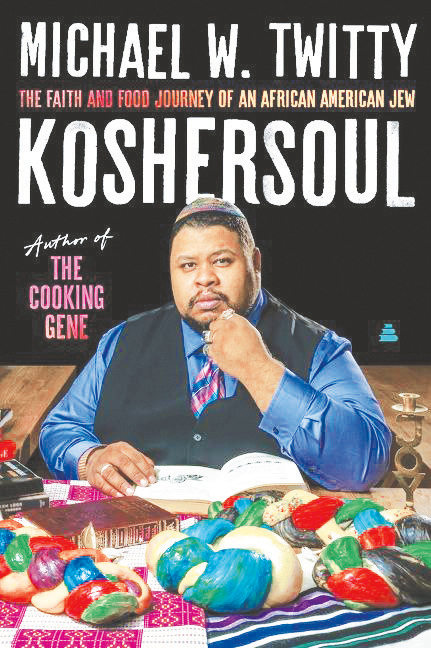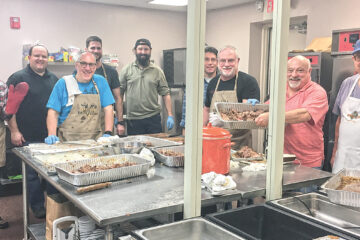Culinary historian, Koshersoul author keynotes Yellow Springs-based Black Farming Conference

By Andrew Esensten, J.
The cover of Michael Twitty’s new book shows the culinary historian and chef with several multicolored challahs in front of him. There is a rainbow Pride one, a blue-and-white Israeli flag one, and a red-black-and-green Pan-African flag one. The largest loaf includes all of the colors of the other three.
“The challot on the front are done purposely to represent all parts of me,” Twitty said. “I wanted people to understand that this is how all of us are. We’re all a braid. I’m kind of blatant about the idea that being American is by default being intersectional.”
Koshersoul: The Faith and Food Journey of an African American Jew is the second part of a trilogy of autobiographical books by Twitty, who identifies as “Afro-ashke-phardi” and gay. The first installment, The Cooking Gene: A Journey Through African American Culinary History in the Old South, won the 2018 Book of the Year Award from the James Beard Foundation.
The new book went on sale Aug. 9. Twitty will present a virtual keynote Sept. 10 for the Black Farming Conference: Roots, Food & Storytelling, presented by the Yellow Springs-based Agraria Center for Regenerative Practice, Central State University, Antioch College, and the National Afro-American Museum & Cultural Center.
“Koshersoul” — a term Twitty uses to mean “the nexus of the essence of Blackness and Jewishness” — is part memoir, part history of Black Jewish customs and foodways, and part cookbook. There are vignettes from his life, including when he attended synagogue for the first time in Maryland, his first trip to Israel on Birthright, and his experiences as a Hebrew school teacher.

He also writes about the alienation he has felt in Jewish spaces. For example, he notes that he carries his conversion certificate — which he refers to as his “freedom papers” — to prove his Jewishness whenever it is called into question.
“When someone claims they can’t see my Jewish soul, I can throw the papers in their face and tell them to get their soul checked,” he writes.
Koshersoul also contains interviews with other prominent Black Jews, including Tema Smith and Rabbi Shais Rishon aka MaNishtana, as well as dozens of original or adapted recipes organized by Jewish holidays. There are recipes for “koshersoul collards,” yam kugel, black-eyed pea hummus, and brisket prepared with the berbere spice used in Ethiopian and Eritrean cuisine.
“It is in many ways a love letter to Jewish peoplehood,” Twitty said of the book. “But it’s also a reminder to (non-Jewish) Black folks that we (Jews) are Black, too.”
Twitty has appeared on episodes of Padma Lakshmi’s Hulu series Taste the Nation and Michelle Obama’s Waffles & Mochi, a cooking show for kids. Earlier this year, he launched a MasterClass in which he teaches online lessons on researching one’s culinary roots. He also sells his own Cooking Gene collection of spices through Spice Tribe.
He said he feels a strong responsibility to use his platform to celebrate what it means to be Black and Jewish and to speak out against ignorance and bigotry.
“Gratefully, there’s many others of us out there who also shoulder this burden,” he said.
“I want people to know that being Black and being Jewish is not an anomaly or a rare thing,” he writes in Koshersoul. “I want people to know how these two identities have such a rich history that the lessons we’ve learned across time and space complement each other and have so much to teach us about community, self-determination, diaspora, nomadism, and collective liberation.”
Michael Twitty will present a virtual keynote for the Black Farming Conference: Roots, Food & Storytelling, at 1 p.m., Saturday, Sept. 10. The conference is presented by the Agraria Center for Regenerative Practice, Central State University, Antioch College, and the National Afro-American Museum & Cultural Center. For registration information, go to agrariacenter.org or contact Ariella Brown.
To read the complete September 2022 Dayton Jewish Observer, click here.



